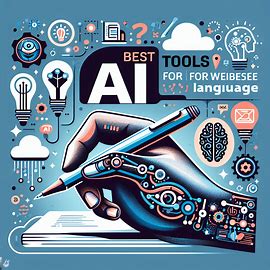Picking the Perfect AI Companion
Welcome to the world of AI, where the right tools can make or break your website’s communication. Your website’s language and tone are its heartbeat. They give life to your brand’s personality. This blog will guide you through selecting AI tools for website language that resonate with your voice.
Imagine AI tools as the ambassadors of your website. They talk to your users, answer queries, and guide them. You need AI that speaks clearly, warmly, and effectively. It should mirror your website’s spirit.
We’ll walk you through the essentials. You’ll learn how to choose AI that aligns with your tone. We’ll show you how to ensure your AI speaks your language, literally and figuratively. No jargon, no confusion, just a clear path to AI that works for you.
Join us as we embark on this journey. Let’s find the AI that not only understands your words but also the emotions behind them. Get ready to enhance your website with AI that speaks your language, engages your audience, and elevates your brand.
How to Create an Engaging Website Language
Website language is the way you communicate with your visitors through words, phrases, sentences, and paragraphs on your website. It is one of the most important aspects of your website, as it can influence how your visitors perceive your brand, trust your message, and take action on your offer.
However, creating an engaging, easy-to-understand, and unique website language is not an easy task. You need to consider many factors, such as your website goals, audience, tone, style, format, and SEO. You also need to avoid common pitfalls, such as jargon, clichés, grammar errors, and plagiarism.
In this article, we will show you how to create an engaging, easy-to-understand, and unique website language that can help you attract, retain, and convert your visitors. We will also provide you with some real-life examples and tips to inspire you and guide you along the way.
Why Website Language Matters
Website language matters because it can make or break your website’s success. According to a study by Microsoft, the average attention span of online users is only 8 seconds. This means that you only have a few seconds to capture your visitors’ interest and convince them to stay on your website.
Moreover, website language can affect your website’s credibility and authority. According to a study by Stanford University, 75% of online users judge a website’s credibility based on its design, and one of the key elements of design is the website language. If your website language is unclear, inconsistent, or unprofessional, your visitors may doubt your expertise and reliability.
Furthermore, website language can impact your website’s conversion rate and revenue. According to a study by Unbounce, 79% of online users will leave a website if the content is not relevant to their needs or expectations. On the other hand, if your website language is engaging, easy-to-understand, and unique, your visitors may be more likely to trust your offer and take action on your call to action.
Therefore, website language is not something that you can ignore or neglect. It is a powerful tool that can help you achieve your website goals and objectives.
How to Create an Engaging Website Language
An engaging website language is one that can capture your visitors’ attention, interest, and curiosity. It is one that can make your visitors feel connected, involved, and valued. It is one that can motivate your visitors to explore your website, learn more about your brand, and take action on your offer.
To create an engaging website language, you need to follow these steps:
- Know your website goals and objectives: What are you trying to achieve with your website? What are the desired actions and outcomes that you want from your visitors? Your website goals and objectives will help you define the purpose and direction of your website language.
- Know your website audience and persona: Who are your ideal and target visitors? What are their needs, preferences, expectations, and pain points? How do they communicate and consume information? Your website audience and persona will help you tailor your website language to your visitors’ characteristics and behaviors.
- Know your website voice and tone: How do you want to sound and express yourself on your website? What are the values, emotions, and personality that you want to convey and evoke? Your website voice and tone will help you create a consistent and distinctive website language that reflects your brand identity and resonates with your visitors.
- Use a conversational tone: A conversational tone is one that is friendly, informal, and natural. It is one that uses simple and familiar words, short and active sentences, contractions, questions, and exclamations. A conversational tone can help you create a more engaging and relatable website language that can build rapport and trust with your visitors.
- Incorporate real-life examples: Real-life examples are stories, anecdotes, testimonials, case studies, or statistics that illustrate your website language and support your claims. Real-life examples can help you create a more engaging and credible website language that can demonstrate your value and results to your visitors.
- Take a storytelling approach: A storytelling approach is one that uses a narrative structure to organize and present your website language. It is one that follows a clear and logical sequence of events, such as introduction, problem, solution, benefit, and call to action.
Some examples of engaging website language:
Airbnb:
Airbnb uses a conversational tone, real-life examples, and a storytelling approach to create an engaging website language that invites visitors to explore and book unique accommodations around the world. For instance, on their homepage, they use phrases like “Find adventures nearby or in faraway places and access unique homes, experiences, and places around the world.”, “Unforgettable trips start with Airbnb.”, and “Book sunny lofts, beachfront flats, and more verified places to stay in a city with world-class coffee and street art.” to spark curiosity and excitement among their visitors.
Slack:
Slack uses a conversational tone, real-life examples, and a storytelling approach to create an engaging website language that showcases their product as a powerful and flexible collaboration tool for teams. For instance, on their homepage, they use phrases like “Slack is where work happens.”, “Slack is a new way to communicate with your team. It’s faster, better organized, and more secure than email.”, and “See how Slack helps teams achieve their goals.” to highlight their value proposition and benefits to their visitors.
Mailchimp:
Mailchimp uses a conversational tone, real-life examples, and a storytelling approach to create an engaging website language that promotes their platform as a smart and easy solution for marketing and growing businesses. For instance, on their homepage, they use phrases like “Mailchimp helps small businesses do big things, with the right tools and guidance every step of the way.”, “Bring your audience data, marketing channels, and insights together so you can reach your goals faster—all from a single platform.”, and “Get the help you need, whenever you need it with our 24/7 support.” to emphasize their features and support to their visitors

Some examples of AI tools for website language and tone are:
Duolingo: Duolingo uses simple and familiar words, short and active sentences, bullet points and lists, and headings and subheadings to create an easy-to-understand website language that explains their product as a fun and effective way to learn languages.
Evernote: Evernote uses simple and familiar words, short and active sentences, bullet points and lists, and headings and subheadings to create an easy-to-understand website language that demonstrates their product as a powerful and versatile tool for organizing and managing information
TextCortex: This is an AI tone changer that can help you create high-quality writing with native human-sounding output within every text box. You can use it to rephrase, rewrite, summarize, or paraphrase your content, and choose from different tones, such as simple, creative, or formal. You can also use it to generate content about any topic with an expert understanding.
Jasper: This is an AI rewriter tool that can help you take your content to the next level. It uses cutting-edge AI and NPL to analyze and rewrite your content, making it more engaging and effective. You can use it to improve your SEO ranking, readability score, keyword density, and plagiarism detection.
ElevenLabs: This is an AI voice generator that can help you create realistic and natural-sounding voices in any language. You can use it to convert text to speech or speech to text with 29 languages and diverse accents. You can also use it to customize the pitch, speed, volume, and emotion of your voice.
Hostinger: This is an AI web development tool that can help you create stunning websites in minutes. It uses advanced algorithms and templates to generate high-quality and optimized code for your website. It also offers features such as SEO optimization, content analysis, site speed optimization, security protection, and more.
Conclusion:-
Selecting AI Tools: A Conclusion
Choosing the right AI tools for your website’s language and tone is vital. It shapes how users interact with your site. The right AI enhances user experience. It makes your site more accessible and engaging.
Focus on tools that understand your audience. They should match your site’s tone. They must offer clear, helpful responses. Look for AI that learns and grows with your site. It should adapt to new trends and user feedback.
Remember, the goal is a seamless user experience. Your AI tools are partners in this journey. They represent your brand’s voice. Choose wisely and your website will thrive.
Keep these points in mind:
- Match AI tools to your site’s tone.
- Ensure they are user-friendly.
- Opt for adaptable AI solutions.
Your website deserves the best AI tools. Tools that speak your language and echo your values. This is your path to a standout digital presence.


My brother suggested I would possibly like this website.
He was totally right. This put up truly made my day. You cann’t imagine
just how so much time I had spent for this information!
Thank you!
Also visit my web-site – vpn special coupon code 2024
I’m not sure exactly why but this web site is
loading incredibly slow for me. Is anyone else having this issue
or is it a problem on my end? I’ll check back later on and see
if the problem still exists.
My website :: vpn special coupon
We stumbled over here coming from a different web address and thought I should check things out.
I like what I see so now i’m following you. Look forward to looking into your web page
repeatedly.
Here is my page; facebook vs eharmony
Appreciation to my father who stated to me on the topic of this website, this web site is truly remarkable.
Look at my blog … nordvpn special coupon code 2024